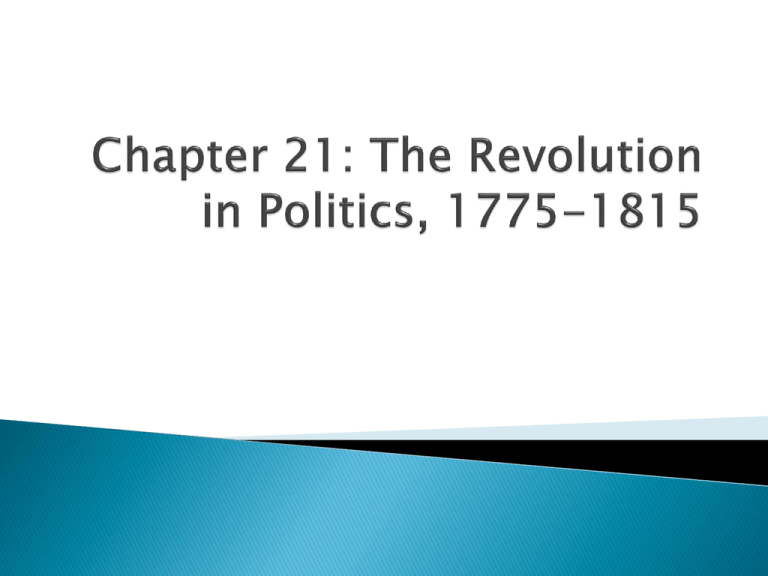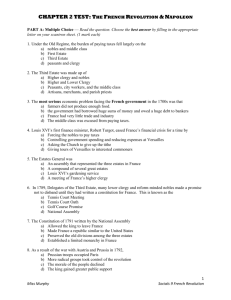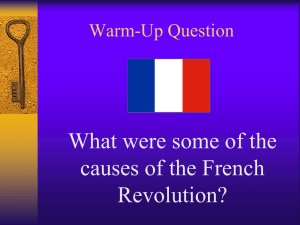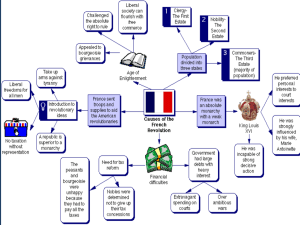Chapter 21: The Revolution in Politics, 1775-1815
advertisement

France’s population was legally divided into three orders or estates; the clergy, the nobility, and everyone else. Historians have long focused attention on growing tensions between the nobility and the bourgeoisie, seeing in this conflict the origins of the Revolution New research has challenged this view. A century of political and fiscal struggle preceded the Revolution Between 1715 and 1723, a number of institutions, including the parlements, regained powers they have lost under Louis XIV Efforts to impose new taxes after the War of the Austrian Succession were effectively opposed by the Parlement of Paris. Louis XV’s official Rene De Maupeou led a royal backlash against the parlements, leading to charges of “loyal despotism.” Scandalous pamphlets contributed to the desacralization of the monarchy. The American Revolution had a huge impact on France. The American Revolution had its immediate origins in struggles over taxation. British efforts to increase taxes after the Seven Years’ War drew an angry reaction from American colonists. Disputes over taxes and representation flared up over the course of the late 1760s and the early 1770s. Fighting that began in 1775, moved the colonies slowly toward open rebellion and a declaration of independence. The French supported the colonists in their struggle with Britain. The American Revolution came to an end with the signing of the Treaty of Paris (1783). Europeans were fascinated by the political lessons of the American Revolution. The American Revolution inspired French intellectuals and drained the French treasury. By the 1780s, half of France’s annual budge went for interest payments on the national debt. The French government was too weak to survive a declaration of bankruptcy. With no national bank, France could not print money to cover its debt. Only fundamental reform of the tax system would bring increased revenue. The king convened an Assembly of Notables to gain support for a new general tax. The Assembly refused to support the new taxes and were dismissed by the king, who then established the taxes by decree. Negative reaction to these decrees forced the king to call for a meeting of the Estates General. Prior to the meeting of the Estates General, elections were set for the three orders and local assemblies prepared lists of grievances. There was considerable popular participation in the elections. After intense debate over voting procedure, the Third Estate left the meeting of the Estates General and declared itself the Nation Assembly (June 1789). The king’s response to this development was ambivalent. In Paris, common people, who were hungry and facing unemployment due to harvest failure, organized to prevent dismissal of the king’s finance minister. On July 13, 1789, an angry crowd stormed the Bastille and seized weapons stored there. Peasant uprisings in the countryside resulted in the Great Fear and led the National Assembly to abolish feudal dues and other peasant obligations to the nobility (August 1789) Also in August 1789, the National Assembly issued a Declaration of the Rights of Man , stating, “Men are born and remain free and equal in rights.” Several thousand women forced the king to move from Versailles to Paris. The National Assembly created a constitutional monarchy with the reluctant consent of King Louis XVI. A new constitution went into effect in 1791. Peasants reacted negatively to the National Assembly’s attempt to increase state control over the Catholic Church. Slaves made up the vast majority of the population of Saint-Domingue. The free population was divided by color and wealth. The turmoil of the 1780s challenged the status quo. The National Assembly sided with white planters and gave each colony the right to draft its own constitution. In July 1790, Vincent Oge led a failed effort at rebellion against colonial authorities. Liberal compromises enacted by the National Assembly failed to satisfy the contradictory ambitions in the colonies. Edmund Burke published the classic critique of the French Revolution, Reflections on the Revolution in France, in 1790. Mary Wollstonecraft published her rebuttal, A Vindication of the Rights of Man the same year. She went on to publish her masterpiece, A Vindication of the Rights of Women in 1792. Wollstonecraft and the Frenchwoman Olympe de Gouges argued that women should be included in the liberal idea of equality. In the summer and fall of 1791 the Revolution was radicalized by several events. Louis XVI’s attempt to escape France Austria and Prussia’s declaration of readiness to intervene in France under certain conditions. The election of a new Legislative Assembly under a new constitution. By the summer of 1792, France was at war with Austria and Prussia and the Legislative Assembly had removed Louis XVI from the throne. Members of the newly elected National Convention declared France a Republic in September 1792. Revolutionaries tried to create a new revolutionary French culture. The Convention tried and executed Louis XVI on charges of treason. The sans culottes, or working people of Paris, exercised a strong influence on the Convention. Military defeats prompted the revolutionary government, led by the Committee of Public Safety, to establish a primitive sort of centrally controlled government, with fixed prices for bread, rationing, tight control of munitions industry, and other controls. The Terror aimed to crush all opponents of the Revolution. About 40,000 French were executed in the Terror and 300,000 suspects were arrested. France mobilized a huge number (800,000) of motivated soldiers by instituting a draft and encouraging patriotic sentiment. Outnumbering their opponents by perhaps four to one, France won great battlefield victories. In August 1791, slaves took an active role in the conflict between whites and free coloreds. Slave revolts swept across the island. On April 4, 1792, the National Assembly enfranchised all free blacks and free people of color, but not slaves. Warfare in Europe soon spread to SaintDomingue. On February 4, 1794, the National Convention abolished slavery in all French territories. By 1796, France had regained control of SaintDomingue and Toussaint Louverture had emerged a key military leader. The Convention, fearing the expansion of the Terror, executed Maximilien Robespierre in 1794. A new executive, the five-man directory, ruled France from 1795-1799, essentially as dictators. The end of economic controls hit the poor in Paris hard, and resulted in riots that were suppressed by force. In rural France, villagers, especially women, restored a normal, structured lifestyle, based in part on the Catholic Church. A new legislative assembly chose a five-man executive—the Directory. The Directory pursued an expansionist military policy. Disgust with the Directory led to electoral defeat in 1797. The Directory used the army to nullify the elections. In 1799, Napoleon Bonaparte led a coup d’état that ended the Directory. Napoleon confirmed the gains of the peasantry and reassured the middle class by defending property. He strengthened the central bureaucracy of France. By the Concordat of 1801 he simultaneously reinstated freedom of worship for Catholics and maintained tight control of the Church. Napoleon’s new law code reduced women’s legal and property rights. Napoleon established a police state and strict censorship to silence political dissent. Austria accepted all its territorial losses to France in the Treaty of Luneville (1801). The Treaty of Amiens with Great Britain (1802) gave France Holland, the Austrian Netherlands, the west bank of the Rhine, and most of the Italian peninsula. In May 1803 Napoleon renewed war with Britain, but his plans to invade the island were shattered by the naval battle of Trafalgar (1805). Austria, Russia, and Sweden joined Britain in the Third Coalition against Napoleon (1805). Napoleon defeated the Coalition’s continental partners. In 1806 Napoleon crushed Prussia. The Treaty of Tilsit (1807) brought an end to the fighting between France, Prussia, and Russia. Toussaint Louverture became the de facto ruler of the western province of Saint-Domingue. Andre Riguad set up his own government in the southern peninsula. Tensions between the two men led conflict eventually won by Louverture. Napoleon attempted to bring the colony back under direct French control and to reintroduce slavery. Louverture was arrested and deported. The French forces were defeated and the creation of a new, independent nation called Haiti was declared on January 1, 1804. French occupation of much of Europe eventually produced nationalist reactions, as the conquered areas attempted to throw off French rule. In June 1812, Napoleon invaded Russia. He was defeated. Joined by Austria and Prussia, Russia and Great Britain defeated Napoleon in 1814. The victorious allies set up a constitutional monarchy in France under Louis XVIII.











